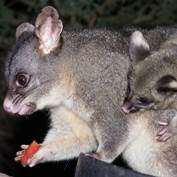A groundbreaking approach to predicting the behaviour of wild animals after relocation may provide a major boost to conservation programs in Australia.
Murdoch University Honours student Tegan May investigated whether there was a link between behavioural traits of wild brushtailed possums and their survival rates after translocation.
This is one of the first behavioural trait studies to use wild animals.
Professor Trish Fleming, who supervised Tegan's research, said that traits that help animals to thrive in captivity, such as boldness and a lack of fearfulness, can be disastrous in a wild environment.
"Translocating fauna to new reserves is a widely used method to protect vulnerable species, and it is important to find ways to keep these animals alive," Professor Fleming said.
"We were interested in seeing whether behavioural traits could be used as a predictor for survival success."
The Murdoch research team worked with Dr Manda Page from the Australian Wildlife Conservancy to move a group of brushtailed possums from the feral-proof fenced Karakamia reserve to the partially-fenced Paruna wildlife sanctuary.
The behaviour of the animals was monitored closely during their period in captivity, looking for traits of boldness, exploration, sociability, aggression and fearfulness.
The animals were then closely monitored for five months in the wild.
"There were clear links between behaviours seen in captivity and the chance of survival after release," Professor Fleming said.
"We found that animals that we had identified as fearful in captivity had a much a greater rate of survival in the wild. They did not gain as much weight as the bolder animals, who headed out further to explore and forage for food, but more fearful individuals were more likely to survive until the end of the study."
Professor Fleming said that this research formed the start of a series of studies on the behavioural traits of translocated animals, aiming to draw patterns from different species.
"If we can predict the animals who are most like to survive translocation, we can make a big improvement to survival rates in conservation," she said.
"Different species will be advantaged by different traits but we are hoping to be able to build a large enough data set to extrapolate to other species."
The westernWEB research team is now working with another research student on woylie translocation behaviour.
Provided by Murdoch University
























